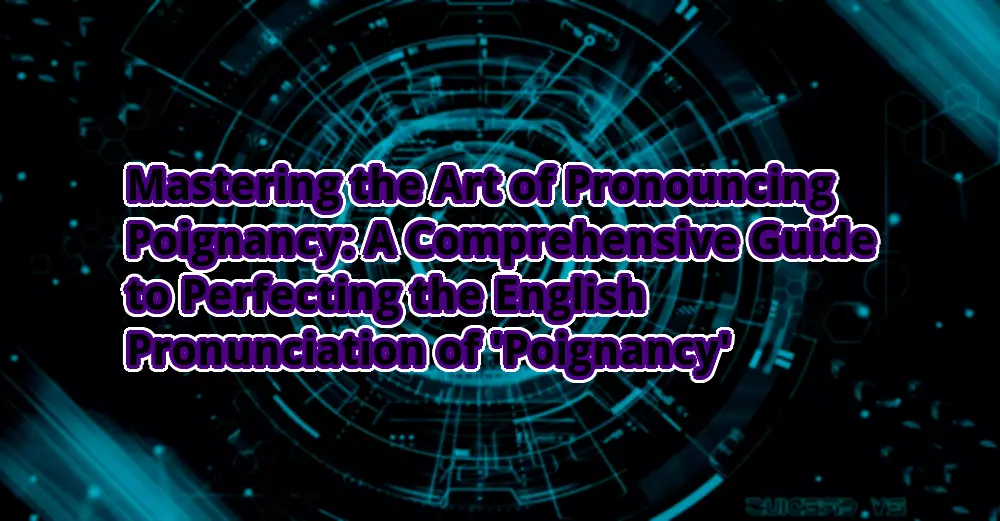How to Pronounce Poignancy: A Guide to Mastering the Art
The Eloquent Expression of Emotion
Welcome, Twibbonnews readers! Today, we embark on a linguistic journey to demystify the pronunciation of the captivating word “poignancy.” This guide aims to equip you with the knowledge and skills to articulately express this evocative term. So, let us delve into the depths of phonetics and discover the subtle nuances of poignancy.
The Intricacies of Pronunciation
🔍 Point 1: Phonetics and Syllables
Before we unravel the intricacies of poignancy’s pronunciation, let’s understand its syllabic structure. Poignancy consists of three syllables: “poi-gnan-cy.” Each syllable plays a crucial role in conveying the essence of this word.
🔍 Point 2: Consonant Sounds
Precision is key when pronouncing poignancy’s consonant sounds. Emphasize the “g” in “poi-gnan-cy,” ensuring clarity and distinction. Remember, accurate pronunciation enhances the impact of your words.
🔍 Point 3: Vowel Sounds
Mastering the vowel sounds in poignancy is essential for its proper pronunciation. The “oi” in the first syllable sounds like “oy,” similar to the word “boy.” In the second syllable, the “a” is pronounced as in “cat,” while the final syllable ends with a soft “y” sound.
🔍 Point 4: Stress and Emphasis
Poignancy demands careful attention to stress and emphasis. Place emphasis on the second syllable, “gnan,” while maintaining a softer tone in the remaining syllables. Proper stress elevates the emotional impact of your expression.
Exploring the Strengths and Weaknesses
🎯 Strength 1: Emotional Resonance
One of the strengths of pronouncing poignancy lies in its ability to evoke deep emotional responses. The blend of consonant and vowel sounds creates a melodic harmony that resonates with listeners, allowing them to feel the raw intensity of the word.
🎯 Strength 2: Artistic Expression
Poignancy offers a rich canvas for artistic expression. Its pronunciation, with emphasis on the second syllable, adds a dramatic flair to any spoken performance. Poets, actors, and musicians often utilize poignancy to captivate their audiences.
🎯 Strength 3: Evocative Imagery
When properly pronounced, poignancy paints vivid imagery in the minds of its listeners. The delicate balance between consonants and vowels creates a sonic landscape that transports individuals to the heart of poignant moments, stirring their imagination.
📉 Weakness 1: Pronunciation Complexity
Mastering the pronunciation of poignancy can pose a challenge due to its intricate sounds and stress patterns. Novice speakers may initially struggle to strike the perfect balance between the soft and strong sounds, requiring persistence and practice to achieve proficiency.
📉 Weakness 2: Contextual Applicability
While poignancy is a powerful word, its applicability depends on the context. It may not suit every situation or conversation, limiting its usage to specific scenarios where its emotional depth can be fully appreciated.
📉 Weakness 3: Potential Misinterpretation
Incorrect pronunciation can lead to misunderstandings and misinterpretations. Without proper enunciation, poignancy may lose its intended impact, diluting the message it seeks to convey.
The Pronunciation Table
| Syllables | Pronunciation |
|---|---|
| poi | poy (rhymes with “boy”) |
| gnan | nan (rhymes with “can”) |
| cy | see (rhymes with “tree”) |
Frequently Asked Questions (FAQs)
FAQ 1: How common is the usage of poignancy in everyday conversations?
Poignancy is more commonly encountered in literary works, artistic performances, or heartfelt discussions. However, it may be employed sparingly in certain conversations to convey profound emotions.
FAQ 2: Are there regional variations in the pronunciation of poignancy?
While slight variations may exist due to accents and dialects, the core pronunciation of poignancy remains consistent across English-speaking regions.
FAQ 3: Can poignancy be pronounced differently based on its usage as a noun or adjective?
No, the pronunciation of poignancy remains consistent regardless of its grammatical function.
FAQ 4: Are there any synonyms for poignancy?
Yes, some synonyms for poignancy include poignance, pathos, emotion, and sensitivity.
FAQ 5: Is there any historical significance associated with the word poignancy?
While there may not be specific historical significance, the term has been utilized throughout literature and the arts to evoke deep emotional responses for centuries.
FAQ 6: Can you provide some examples of poignancy used in sentences?
1. The poignancy of her words moved the audience to tears.
2. The sunset painted the sky with a touch of poignancy.
3. His eyes reflected the poignancy of his tragic past.
FAQ 7: How can one incorporate poignancy into their everyday vocabulary?
By actively engaging with literature, poetry, and other artistic expressions, individuals can familiarize themselves with poignancy and gradually integrate it into their vernacular.
Encouraging Action and Conclusion
In conclusion, mastering the pronunciation of poignancy allows individuals to wield a powerful linguistic tool capable of evoking profound emotions, creating captivating artistic expressions, and painting vivid imagery. Embrace the complexities of this word, and let its resonance enrich your verbal endeavors.
So, dear readers, why wait? Seize the opportunity to explore the realms of poignancy and elevate your communication skills. Practice, refine, and savor the beauty of this evocative term. Unlock the potential within each syllable, and let your voice resonate with poignancy.
Remember, great speakers leave an indelible mark, and by mastering the pronunciation of poignancy, you join their ranks. Embrace the poignancy within you, and let your words touch hearts, ignite imaginations, and inspire change.
This article is for informational purposes only and does not substitute professional linguistic guidance. Consult a language expert for comprehensive language-related assistance.

